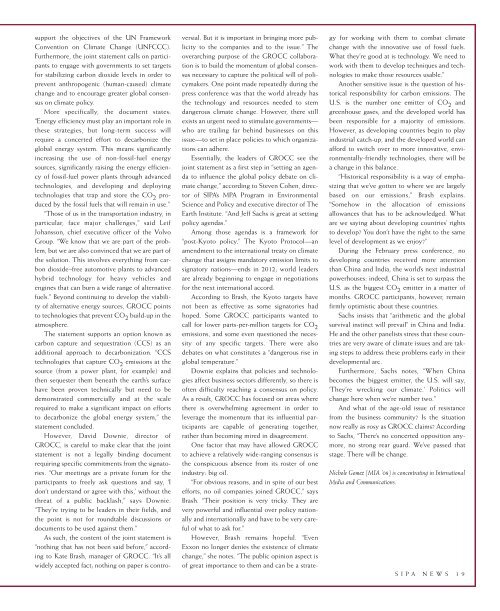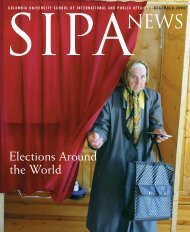The Energy Issue - School of International and Public Affairs ...
The Energy Issue - School of International and Public Affairs ...
The Energy Issue - School of International and Public Affairs ...
Create successful ePaper yourself
Turn your PDF publications into a flip-book with our unique Google optimized e-Paper software.
support the objectives <strong>of</strong> the UN Framework<br />
Convention on Climate Change (UNFCCC).<br />
Furthermore, the joint statement calls on participants<br />
to engage with governments to set targets<br />
for stabilizing carbon dioxide levels in order to<br />
prevent anthropogenic (human-caused) climate<br />
change <strong>and</strong> to encourage greater global consensus<br />
on climate policy.<br />
More specifically, the document states:<br />
“<strong>Energy</strong> efficiency must play an important role in<br />
these strategies, but long-term success will<br />
require a concerted effort to decarbonize the<br />
global energy system. This means significantly<br />
increasing the use <strong>of</strong> non-fossil-fuel energy<br />
sources, significantly raising the energy efficiency<br />
<strong>of</strong> fossil-fuel power plants through advanced<br />
technologies, <strong>and</strong> developing <strong>and</strong> deploying<br />
technologies that trap <strong>and</strong> store the CO 2 produced<br />
by the fossil fuels that will remain in use.”<br />
“Those <strong>of</strong> us in the transportation industry, in<br />
particular, face major challenges,” said Leif<br />
Johansson, chief executive <strong>of</strong>ficer <strong>of</strong> the Volvo<br />
Group. “We know that we are part <strong>of</strong> the problem,<br />
but we are also convinced that we are part <strong>of</strong><br />
the solution. This involves everything from carbon<br />
dioxide–free automotive plants to advanced<br />
hybrid technology for heavy vehicles <strong>and</strong><br />
engines that can burn a wide range <strong>of</strong> alternative<br />
fuels.” Beyond continuing to develop the viability<br />
<strong>of</strong> alternative energy sources, GROCC points<br />
to technologies that prevent CO 2 build-up in the<br />
atmosphere.<br />
<strong>The</strong> statement supports an option known as<br />
carbon capture <strong>and</strong> sequestration (CCS) as an<br />
additional approach to decarbonization. “CCS<br />
technologies that capture CO 2 emissions at the<br />
source (from a power plant, for example) <strong>and</strong><br />
then sequester them beneath the earth’s surface<br />
have been proven technically but need to be<br />
demonstrated commercially <strong>and</strong> at the scale<br />
required to make a significant impact on efforts<br />
to decarbonize the global energy system,” the<br />
statement concluded.<br />
However, David Downie, director <strong>of</strong><br />
GROCC, is careful to make clear that the joint<br />
statement is not a legally binding document<br />
requiring specific commitments from the signatories.<br />
“Our meetings are a private forum for the<br />
participants to freely ask questions <strong>and</strong> say, ‘I<br />
don’t underst<strong>and</strong> or agree with this,’ without the<br />
threat <strong>of</strong> a public backlash,” says Downie.<br />
“<strong>The</strong>y’re trying to be leaders in their fields, <strong>and</strong><br />
the point is not for roundtable discussions or<br />
documents to be used against them.”<br />
As such, the content <strong>of</strong> the joint statement is<br />
“nothing that has not been said before,” according<br />
to Kate Brash, manager <strong>of</strong> GROCC. “It’s all<br />
widely accepted fact; nothing on paper is controversial.<br />
But it is important in bringing more publicity<br />
to the companies <strong>and</strong> to the issue.” <strong>The</strong><br />
overarching purpose <strong>of</strong> the GROCC collaboration<br />
is to build the momentum <strong>of</strong> global consensus<br />
necessary to capture the political will <strong>of</strong> policymakers.<br />
One point made repeatedly during the<br />
press conference was that the world already has<br />
the technology <strong>and</strong> resources needed to stem<br />
dangerous climate change. However, there still<br />
exists an urgent need to stimulate governments—<br />
who are trailing far behind businesses on this<br />
issue—to set in place policies to which organizations<br />
can adhere.<br />
Essentially, the leaders <strong>of</strong> GROCC see the<br />
joint statement as a first step in “setting an agenda<br />
to influence the global policy debate on climate<br />
change,” according to Steven Cohen, director<br />
<strong>of</strong> SIPA’s MPA Program in Environmental<br />
Science <strong>and</strong> Policy <strong>and</strong> executive director <strong>of</strong> <strong>The</strong><br />
Earth Institute. “And Jeff Sachs is great at setting<br />
policy agendas.”<br />
Among those agendas is a framework for<br />
“post-Kyoto policy.” <strong>The</strong> Kyoto Protocol—an<br />
amendment to the international treaty on climate<br />
change that assigns m<strong>and</strong>atory emission limits to<br />
signatory nations—ends in 2012; world leaders<br />
are already beginning to engage in negotiations<br />
for the next international accord.<br />
According to Brash, the Kyoto targets have<br />
not been as effective as some signatories had<br />
hoped. Some GROCC participants wanted to<br />
call for lower parts-per-million targets for CO 2<br />
emissions, <strong>and</strong> some even questioned the necessity<br />
<strong>of</strong> any specific targets. <strong>The</strong>re were also<br />
debates on what constitutes a “dangerous rise in<br />
global temperature.”<br />
Downie explains that policies <strong>and</strong> technologies<br />
affect business sectors differently, so there is<br />
<strong>of</strong>ten difficulty reaching a consensus on policy.<br />
As a result, GROCC has focused on areas where<br />
there is overwhelming agreement in order to<br />
leverage the momentum that its influential participants<br />
are capable <strong>of</strong> generating together,<br />
rather than becoming mired in disagreement.<br />
One factor that may have allowed GROCC<br />
to achieve a relatively wide-ranging consensus is<br />
the conspicuous absence from its roster <strong>of</strong> one<br />
industry: big oil.<br />
“For obvious reasons, <strong>and</strong> in spite <strong>of</strong> our best<br />
efforts, no oil companies joined GROCC,” says<br />
Brash. “<strong>The</strong>ir position is very tricky. <strong>The</strong>y are<br />
very powerful <strong>and</strong> influential over policy nationally<br />
<strong>and</strong> internationally <strong>and</strong> have to be very careful<br />
<strong>of</strong> what to ask for.”<br />
However, Brash remains hopeful. “Even<br />
Exxon no longer denies the existence <strong>of</strong> climate<br />
change,” she notes. “<strong>The</strong> public opinion aspect is<br />
<strong>of</strong> great importance to them <strong>and</strong> can be a strategy<br />
for working with them to combat climate<br />
change with the innovative use <strong>of</strong> fossil fuels.<br />
What they’re good at is technology. We need to<br />
work with them to develop techniques <strong>and</strong> technologies<br />
to make those resources usable.”<br />
Another sensitive issue is the question <strong>of</strong> historical<br />
responsibility for carbon emissions. <strong>The</strong><br />
U.S. is the number one emitter <strong>of</strong> CO 2 <strong>and</strong><br />
greenhouse gases, <strong>and</strong> the developed world has<br />
been responsible for a majority <strong>of</strong> emissions.<br />
However, as developing countries begin to play<br />
industrial catch-up, <strong>and</strong> the developed world can<br />
afford to switch over to more innovative, environmentally-friendly<br />
technologies, there will be<br />
a change in this balance.<br />
“Historical responsibility is a way <strong>of</strong> emphasizing<br />
that we’ve gotten to where we are largely<br />
based on our emissions,” Brash explains.<br />
“Somehow in the allocation <strong>of</strong> emissions<br />
allowances that has to be acknowledged. What<br />
are we saying about developing countries’ rights<br />
to develop? You don’t have the right to the same<br />
level <strong>of</strong> development as we enjoy?”<br />
During the February press conference, no<br />
developing countries received more attention<br />
than China <strong>and</strong> India, the world’s next industrial<br />
powerhouses: indeed, China is set to surpass the<br />
U.S. as the biggest CO 2 emitter in a matter <strong>of</strong><br />
months. GROCC participants, however, remain<br />
firmly optimistic about these countries.<br />
Sachs insists that “arithmetic <strong>and</strong> the global<br />
survival instinct will prevail” in China <strong>and</strong> India.<br />
He <strong>and</strong> the other panelists stress that these countries<br />
are very aware <strong>of</strong> climate issues <strong>and</strong> are taking<br />
steps to address these problems early in their<br />
developmental arc.<br />
Furthermore, Sachs notes, “When China<br />
becomes the biggest emitter, the U.S. will say,<br />
‘<strong>The</strong>y’re wrecking our climate.’ Politics will<br />
change here when we’re number two.”<br />
And what <strong>of</strong> the age-old issue <strong>of</strong> resistance<br />
from the business community? Is the situation<br />
now really as rosy as GROCC claims? According<br />
to Sachs, “<strong>The</strong>re’s no concerted opposition anymore,<br />
no strong rear guard. We’ve passed that<br />
stage. <strong>The</strong>re will be change.<br />
Nichole Gomez (MIA ’08) is concentrating in <strong>International</strong><br />
Media <strong>and</strong> Communications.<br />
SIPA NEWS 19

















